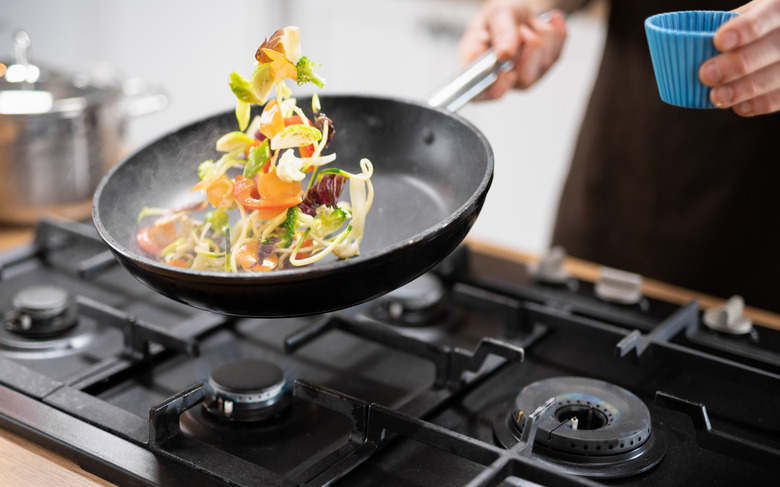Jobs
Top Cooking Skills for Your Resume (With Examples)

If you’re interested in a career in the culinary arts, you may benefit from possessing a variety of cooking skills. These abilities can help you prepare flavorful dishes for a variety of audiences and ensure you create interesting menu items consistently. Understanding what these competencies are and how to feature them on your application documents can help you qualify for a role in this field and ensure you possess the necessary technical knowledge.
In this article, we define what cooking skills are, provide a list of examples, describe how to improve them, review how to demonstrate them in the workplace and discuss how to highlight them throughout the application process.
What are cooking skills?
Cooking skills are abilities that allow you to cook recipes safely and effectively. Although some cooking skills are specific culinary techniques that help you make particular food items, there are also professional skills for cooks that allow you to perform in ways that appeal to customers and impress employers. Possessing strong cooking skills may help you ensure you can prepare food safely for a target customer base.
Examples of cooking skills
To help you understand the types of cooking skills employers often want, examine the following examples:
Cleanliness
Cleanliness is an important skill if you have a role in the culinary arts because it encourages food and kitchen safety, which benefits customers and your team by helping you create a pleasant and healthy environment. As a cook, you can show your cleanliness by cleaning messes in your workplace kitchen and sanitizing tools and dishes with the proper methods. Improve this skill by taking classes on food safety, cleanliness and sanitation either online or at local workshops.
Food safety
Along with food and kitchen hygiene, ensuring proper food safety is paramount in a cooking position. This technical knowledge allows you to ensure food is safe for customers to eat, often following industry standards or local health regulations to prevent foodborne illnesses. For example, knowing what temperature to keep and cook foods safely can prevent spoiling or illness. You also usually uphold health codes, like keeping raw and cooked foods separate.
Teamwork
When you’re skilled in teamwork, you can work more effectively with other cooks and employees in your workplace, like servers. You might use teamwork in various situations at work, including when you cook in a kitchen with others, when you rotate cleaning duties with your team members and when you receive food orders from servers in the dining area. To get better at working with a team, practice your communication skills and think about how you can contribute to a positive work environment with your words and actions.
Kitchen management
Kitchen management is a helpful skill to develop for any position in food service, and sometimes being a kitchen manager is a specific role itself. Learning tasks like ordering food and supplies, creating menus or updating staff schedules can help you hone management skills for a restaurant, for example. Kitchen management skills also often incorporate other ones, like food safety, communication, leadership and team-building.
Detail-oriented
Being detail-oriented helps cooks notice small details in the workplace, like techniques that make a dish better or potential problems that can affect their work. Attention to detail allows you to see a different perspective than others and can help you accomplish goals by planning each step using the information you learn from observing the people and objects around you. Learn to be more detail-oriented by making notes of the details you think could be useful later and examining your team, customers and your workspace for valuable information.
Adaptability
In a cooking career, it’s useful to be adaptable and ready to change your plans or ideas based on new information. This could include situations like adapting an order to a customer’s preference, changing the way you make a dish because of broken appliances or changing a recipe for seasonal produce. Practice your adaptability skills by finding new ways to complete your work in different situations and learning to accept changes to your established methods.
Decision-making
Decision-making skills are useful for professional cooking because many cooks have to make many decisions to keep their customers happy. Some examples of decision-making for a cook include choosing the right ingredients for a new dish, helping your employer choose items for the menu or making sudden adjustments to a dish before a server delivers it. You can get better at making decisions by researching cooking techniques and methods to create more thoughtful solutions and considering your customers and team members when you decide something.
Creativity
Another great cooking skill is creativity, which allows you to learn new things in the kitchen and experiment with food and cooking techniques that impress your employer and customers. There are many ways to be creative in this career, like by trying new flavor combinations and methods for cooking a dish and helping your employer create and implement engaging themes for their restaurant. Some ways to improve your creativity in cooking include brainstorming ideas and researching new cooking methods that can inspire you to make new dishes.
How to improve your cooking skills
Here are some ways to improve your cooking skills:
1. Attend classes or pursue a degree
If you want to learn a specific cooking skill or develop your expertise in this field, consider attending cooking classes or pursuing a degree in culinary arts. Attending classes or completing coursework with others can help you practice many skills like cleanliness and teamwork, and you can learn cooking techniques that may appeal to employers. Although a culinary degree may be useful for some areas of food service, like fine dining, many online and in-person cooking classes are useful for getting a job in most areas of this field.
2. Learn from others
Learning from others is a great way to understand how cooks work with different types of cuisine and what employers might expect from you in the food service industry. While learning from a colleague at the same level as you is a useful method for improving your skills, it’s often valuable to find an experienced mentor to teach you how to behave in a kitchen and to help you learn your strengths. Communicating with other cooks in this way can also develop skills like teamwork and being detail-oriented as you watch them, listen to them and take their advice.
3. Gain experience
To improve your cooking skills further, you can gain experience in a food service job and learn to work with others in a professional environment. Performing work with other cooks gives you the opportunity to see how they do their jobs and in what areas you can improve to be more successful in your role. It’s a good idea to choose a job or internship in an area of food service in which you’re interested so you can learn more about that specific cuisine and industry expectations.
4. Ask for feedback
Asking for feedback from your colleagues, mentors and supervisors can give you valuable information about what you do well and which abilities you can improve. At work, you might ask for feedback during performance reviews to better understand which skills you display the most while working. It’s usually best to ask colleagues and supervisors who work with you frequently because they know more about your typical behavior in a professional kitchen, but mentors who help you train or teach you in class can also be a good source of feedback.
Cooking skills in the workplace
Here are some examples of when you may use cooking skills in the workplace:
-
Leading your team to create a dish: If you have the chance to lead your team in creating a new dish or trying a recipe they haven’t done before, you can use your teamwork skills to communicate with your team effectively and your decision-making skills to divide work between your team and choose ingredients along the way.
-
Substituting a popular meal: Sometimes, you may have to be adaptable and creative if you run out of the ingredients for a popular meal at your workplace, and you can show those skills by finding a similar substitute that you can cook well and advertise as a special offering for the day.
-
Cleaning the kitchen after work: Many cooks may have to clean up their team’s kitchen after work, so you can use this time to demonstrate your cleanliness and attention to detail by using cleaning chemicals safely around food and removing any messes that might disrupt your team’s work.
How to highlight cooking skills
Here are some tips to help you highlight your cooking skills during the job application process:
Cooking skills for a resume
To display your cooking abilities on your resume, create a skills section and list the skills as bullet points so it’s easy for employers to read. Consider reading the job listing again to find specific skills employers want and then use that information to decide which abilities you want to include in your application. You can also add technical cooking skills in this section, like information about which types of food you cook well and any techniques in which you’ve trained.
Cooking skills for a cover letter
Use your cover letter to elaborate on the skills listed on your resume. Take the time to tailor your cover letter for each job listing to which you’re applying. It’s useful to provide context for your cooking skills and give examples of ways in which you demonstrated or developed those skills in previous jobs. For example, if you created a new menu item for the last restaurant for which you worked, share how you used your creativity to determine the best flavor combinations.
Cooking skills for a job interview
During your actual interview, explain any relevant cooking skills using anecdotal stories as you answer questions from potential employers. Reiterate the skills you have that match those listed in the job posting and explain how you have successfully used those skills in the past. Try to discuss how you want to improve your skills in a new role and your plans for using your skills to become a better cook.

Top Cooking Skills for Your Resume (With Examples)
